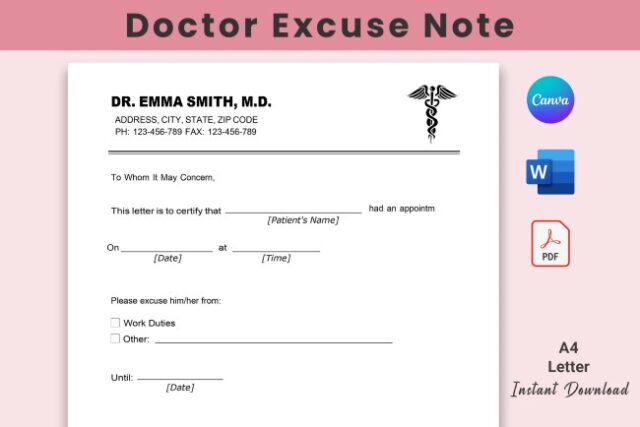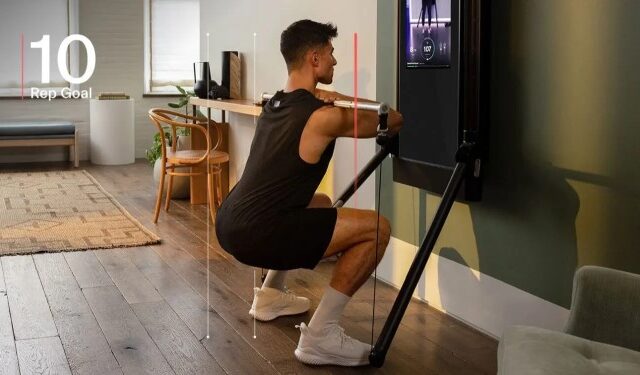In today’s fast-paced working environment, the importance of health cannot be overstated. Yet, balancing professional commitments with personal well-being often forces employees to make tough decisions. This is where a doctor’s note becomes an essential tool. Whether you’re recovering from illness, managing a medical condition, or dealing with an unexpected emergency, a real doctor’s note for work can protect you from workplace issues and ensure that you take the time off you need.
This article will provide comprehensive insights into doctor’s notes for work—how they function, when to use them, and their significance. By the end, you’ll know everything you need about securing a real doctor’s note for work and its value in maintaining a healthy work-life balance.
What is a Doctor’s Note?
A doctor’s note, also known as a medical excuse or sick note, is an official document provided by a licensed healthcare professional. It verifies that you have been seen by a doctor and are either too sick or injured to attend work for a specific period.
The note typically includes the following details:
- The date of the medical visit
- A brief description of your condition (without violating your privacy)
- Recommendations on when you can return to work
- Any necessary accommodations upon returning, such as light duties or shorter hours
It is a crucial document that ensures employers recognize the legitimate medical need for time off, helping protect employees from disciplinary action or job loss.
Why Do You Need a Real Doctor’s Note for Work?
For many people, the idea of missing work can be stressful. However, working through illness or injury can worsen your condition and delay recovery. A real doctor’s note for work ensures you have the required time to rest and recover, without the fear of job-related consequences. Employers typically require official documentation, especially if you miss work for more than a day or two. Having a legitimate doctor’s note provides this assurance.
Here are some reasons why you might need a doctor’s note for work:
- Illness: If you’re suffering from the flu, severe cold, or any contagious condition that could impact your performance or the health of your coworkers.
- Injury: In case of an injury that limits your mobility or ability to perform job tasks.
- Mental Health: Issues such as anxiety, depression, or other mental health conditions can also justify time off with a doctor’s note.
- Medical Appointments: If you need to attend regular check-ups, tests, or follow-up treatments for ongoing medical issues.
- Post-Surgery Recovery: After a medical procedure, you may need time to heal before returning to work.
In these cases, providing a doctor’s note will help safeguard your job, maintain trust with your employer, and ensure that you do not feel pressured to work when you’re not fit to do so.
How to Get a Real Doctor’s Note for Work
The process of obtaining a real doctor’s note for work is simple, but it’s important to follow the correct steps to ensure the note is valid and recognized by your employer.
1. Schedule an Appointment with Your Doctor
The first step is to visit a licensed healthcare provider. This could be your primary care physician, a specialist, or even an urgent care doctor, depending on the nature of your illness or injury. During your visit, be honest about your symptoms and how they are affecting your ability to work.
2. Ask for a Doctor’s Note
If your doctor determines that you need time off from work, don’t hesitate to ask for a note. Most healthcare professionals are familiar with workplace policies and are accustomed to providing notes for their patients. Make sure the note includes your doctor’s name, signature, and contact information, along with the dates you are excused from work.
3. Follow Employer Guidelines
Some companies have specific rules about how and when to submit a doctor’s note. For instance, you may need to provide the note within a certain timeframe or submit it to a particular department, such as HR. Be sure to follow these guidelines to avoid any issues.
4. Keep a Copy for Your Records
Always keep a copy of the doctor’s note for your records. This will help protect you in case there’s any dispute about your absence or if the note gets lost.
What Should a Doctor’s Note Contain?
A real doctor’s note for work is not just a formality. It must contain specific information to be considered legitimate. Here’s what to look for:
- Patient’s Name: Your full legal name, clearly stated, so there’s no confusion about who the note is for.
- Date of the Visit: The note should include the date you visited the healthcare provider.
- Diagnosis or Reason for Absence: While the note doesn’t need to go into detail about your condition, it should indicate the general reason for your time off, like illness or injury.
- Duration of Time Off: The note must specify the number of days you are excused from work, or, if uncertain, a recommendation for follow-up.
- Return Date: If possible, the note should include an estimated date when you can return to work.
- Doctor’s Contact Information: Your doctor’s name, phone number, and signature should be clearly listed, so the employer can verify the note if necessary.
Legal Considerations for Doctor’s Notes
Many countries, including the U.S., protect employees under laws such as the Family and Medical Leave Act (FMLA) and Americans with Disabilities Act (ADA). These laws ensure that employees cannot be penalized for taking medically necessary time off. However, different states or regions might have their own rules regarding sick leave, so it’s essential to understand your rights.
For example:
- In the U.S., employees are entitled to up to 12 weeks of unpaid leave under FMLA for serious medical conditions or family emergencies.
- Some states have mandated paid sick leave, which can be used in conjunction with a doctor’s note.
- Your employer cannot legally request excessive details about your condition beyond what’s provided in the doctor’s note, as this would violate privacy regulations under HIPAA (Health Insurance Portability and Accountability Act).
Consequences of Using Fake Doctor’s Notes
While it might seem tempting to use a fake doctor’s note to get out of work, it’s important to understand the risks involved. Submitting a false note is not only unethical but can lead to severe consequences.
- Termination: If your employer discovers that the note is forged, you could lose your job.
- Legal Ramifications: Falsifying medical documents is a crime and could lead to fines or other legal action.
- Loss of Trust: Once you’re caught, it’s difficult to regain your employer’s trust, which could negatively impact your career in the long term.
Using a real doctr’s note is always the best course of action. If you’re genuinely ill or injured, visiting a dctor to get the necessary documentation will ensure that you’re protected under workplace policies.
How to Handle Returning to Work After Sick Leave
Once you’ve taken the necessary time off to recover, returning to work can be a gradual process. Here are some steps to make the transition smoother:
1. Communicate with Your Employer
Before your return, keep in touch with your employer and inform them of your expected return date. If your dotor recommends any accommodations, such as light duty or flexible hours, communicate this clearly.
2. Submit Follow-Up Documentation
In some cases, your employer may request a follow-up doctr’s note confirming that you are fit to return to work. Make sure to get this during your final medical visit.
3. Ease Back into Work
Don’t rush your recovery. If your illness or injury is serious, your doctor may recommend a gradual return to full duties. This could mean starting with part-time hours or lighter tasks until you’re fully healed.
Conclusion
A real dctor’s note for work is a critical document that protects your health and your job when you need to take time off for medical reasons. By understanding when and how to obtain a valid , you can ensure that your time away from work is covered and that you comply with both medical and workplace guidelines.
While it may seem like a minor detail, this document plays a vital role in balancing professional responsibilities with personal health. So, the next time you’re too ill or injured to work, don’t hesitate to visit your doctor and ask for a —it’s your right and your responsibility to prioritize your health.



MOST COMMENTED
Business
World Politics News: Geopolitical Analysis for Strategic Decision-Makers
Business
World News Headlines: Global Developments Impacting Business and Policy
Business
Top World News Stories: What’s Shaping the Globe Today?
World News
Global News Updates: Stay Informed with Key Events
Crypto
“Current World News: Major Stories of 2025”
Crypto
Be1crypto.com Markets is a cryptocurrency trading platform designed to cater to both novice and experienced traders. It offers a user-friendly interface, a wide range of supported cryptocurrencies, advanced trading tools, and robust security measures. The platform aims to provide a seamless trading experience, allowing users to diversify their portfolios and engage in various trading activities.
World News
Chrisley Knows Best Daughter Dies: Unraveling the Truth Behind the Rumors